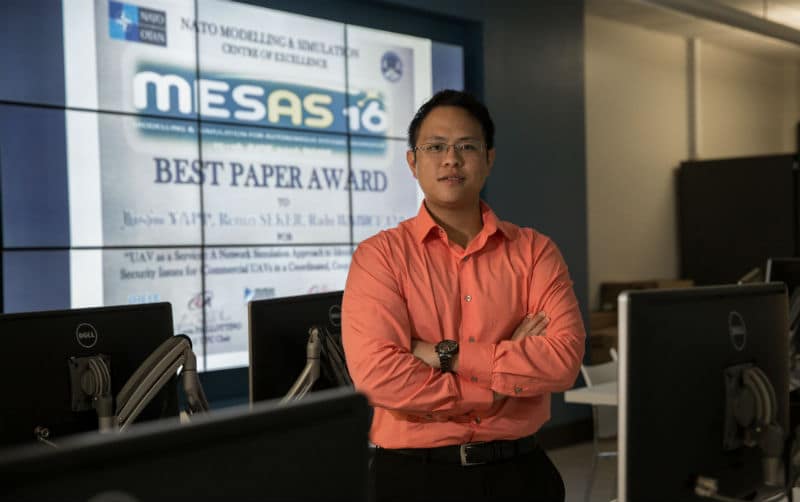Cybersecurity Student, Professors Win NATO Award for UAV Research

Yapp’s research, UAV as a Service: A Network Simulation Environment to Identify Performance and Security Issues for Commercial UAV in a Coordinated, Cooperative Environment, won the Best Paper award at the Modelling and Simulation for Autonomous Systems Workshop hosted by NATO in June 2016. The paper was coauthored by Embry-Riddle professors Remzi Seker and Radu Babiceanu.
Creating a cloud-based system would allow UAV operators and clients more accessibility to UAV-collected data and images, Seker says. For example, a farmer trying to determine the condition of his crops could access clusters of available commercial UAVs through the cloud infrastructure, he explains. Essentially, this would enable business owners and individuals to rent UAVs for short-term use rather than buy them and navigate Federal Aviation Administration guidelines on their own.
“This is analogous to Hertz or Avis renting cars,” Seker says. “It’s more complicated than that but the concept is similar.”
To further develop the research, Yapp hopes to obtain funding for a testbed site, where he could operate UAVs and the cloud-based communications system in real-time.
CENTER OF ACADEMIC EXCELLENCE
Seker credits the NATO award in part to Embry-Riddle’s research-intensive computer systems engineering and cybersecurity environment. In May 2016, the Daytona Beach Campus was named a National Center of Academic Excellence (CAE) in cyber defense education by the National Security Agency and the Department of Homeland Security. The designation includes a focus area of secure software development.
“The CAE designation in cyber defense education is a major accomplishment for our Cybersecurity and Assured Systems Engineering Center (CyBASE),” says Seker, who directs the CyBASE research center at Embry-Riddle. “As one of only five schools in the country with a secure software development specialization, our students and research teams should see immediate benefits in access to prospective research grant awards, scholarships and job opportunities.”
- Story features contributions by Lacey McLaughlin and James Roddey
